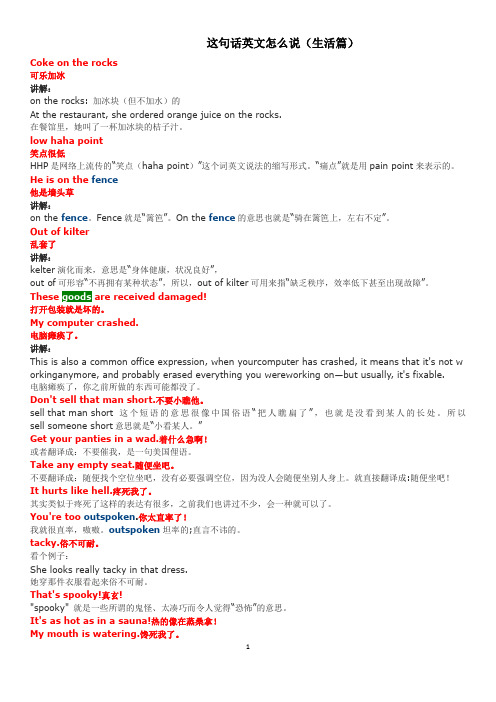have-to的用法.txt
- 格式:docx
- 大小:17.61 KB
- 文档页数:3

这句话英文怎么说(生活篇)Coke on the rocks可乐加冰讲解:on the rocks: 加冰块(但不加水)的At the restaurant, she ordered orange juice on the rocks.在餐馆里,她叫了一杯加冰块的桔子汁。
low haha point笑点很低HHP是网络上流传的“笑点(haha point)”这个词英文说法的缩写形式。
“痛点”就是用pain point来表示的。
He is on the fence他是墙头草讲解:on the fence。
Fence就是“篱笆”。
On the fence的意思也就是“骑在篱笆上,左右不定”。
Out of kilter乱套了讲解:kelter演化而来,意思是“身体健康,状况良好”,out of可形容“不再拥有某种状态”,所以,out of kilter可用来指“缺乏秩序,效率低下甚至出现故障”。
These are received damaged!打开包装就是坏的。
My computer crashed.电脑瘫痪了。
讲解:This is also a common office expression, when yourcomputer has crashed, it means that it's not w orkinganymore, and probably erased everything you wereworking on—but usually, it's fixable.电脑瘫痪了,你之前所做的东西可能都没了。
Don't sell that man short.不要小瞧他。
sell that man short这个短语的意思很像中国俗语“把人瞧扁了”,也就是没看到某人的长处。
所以sell someone short意思就是“小看某人。
”Get your panties in a wad.着什么急啊!或者翻译成:不要催我,是一句美国俚语。





当你听到有人这么说英语:Aiya, what’s the matter with you? Wei, are you John? Aiyo, I hurt my head. 你会感觉怎么样?说的是英语,发出的语气词却是地道的汉语。
这种现象太普遍了。
原因就在于,我们对老外的语气词太不了解了。
所以要想把英语讲得有洋味儿,你首先要学会像老外那样哼哼哈哈!下面是老外常用的语气词,快学会它们吧:Ah [ɑ:] 表痛苦、欢乐、懊悔、憎恨、厌恶、惊讶、遗憾、蔑视等Aha [ɑ:'hɑ:] 表满意、快乐、胜利、得意、惊讶等;常含有冷嘲热讽或愚弄意1. Aha! That's it. Now I know what to do. 啊哈!就是这样。
现在我知道该怎么做了!2. Aha, so there you are! 啊哈,原来你在这里。
Ahem [ə'hem] 咳嗽声,唤起注意, 或表示怀疑Ahem, I wonder if I can raise this problem with you now. 呃哼,我现在能否向您提及这问题。
Bah! [ bɑ: ] 轻蔑,厌恶Bah! You've wasted my time. Goodbye. 呸!你在浪费我的时间,再见。
Blah [bla:] 反复地说,什么什么的1. All she does is go "blah-blah-blah" all night, but she never says anything worth remembering the next morning. 她整夜说个不停,但没有一句值得记到第二天早上的话。
2. You have to listen to Charles talk about how bad the Rockets are and that it needs to be T-Mac's team, blah blah blah. 你必须听着巴克力说火箭有多么糟糕,还有这应该是麦迪一个人的球队,什么什么的。
商务英语案例.txt B: I know. But pricing has to be based on what customers want too, which differs fromplace to place and time to time.A: Yes, experience shows the same product is priced differently in different markets.But why so much higher in this market?B: There are many rich people in this area, so a skimming price is OK -- and evenneeded, because they think only a high price means a good product.A: But the market prices for other similar products are much lower. Buyers will noticethe flexibility in the price structure, and buy from other companies.B: I don't think so. I think the others will have to raise their price ceiling tomake customers believe that their products are as good as ours.A: 我真的认为这个价钱太高。
价钱是要根据成本和你所想要的利润而定。
B: 我知道。
但是定价也须以顾客的需要为基础,而这种需要是会因时因地而异的。
A: 没错。
根据经验,相同产品在不同的市场会订出不同的价钱。
但为什么在这个市场要订这么高?B: 这个地区多的是有钱人,所以最高利润价行得通,甚至可以说是必要的。
have to 用法分析
have to是情态动词,意思是“必须;不得不”,表示客观要做的事情,后接动词原形。
一、have to的单数和复数
have to虽是情态动词,但有人称或数的变化。
一般现在时第三人称单数用has to,其他人称用have to。
例如:
You have to go with Tom.你得跟汤姆去。
She has to answer this question. 她不得不回答这个问题。
二、have to的肯定式
have to的肯定式由“have to+动词原形”构成。
例如:
I have to tell him the news.我得告诉他这个消息。
She has to walk home.她不得不走回家。
三、have to的否定式
have to的否定式由“don’t have to+动词原形”或“doesn’t have to+动词原形”构成。
例如:
You don’t have to do like this.你不必这样做。
He doesn’t have to be there on time. 他不必按时到那里。
have to的否定式还可在have/has后面加not (仅限于一般现在时和一般过去时)。
例如:
He hasn’t to go there.他不必去那里。
I haven’t to get up early.我不必早起床。
四、have to的疑问式
have to的一般疑问式通常由“Do/ Does + 主语+have to+动词原形+其他成分”构成,肯定回答用do或does;否定回答用don’t(have to)或doesn’t(have to)。
例如:
①–Do you have to go now?你现在就得去吗?
–Yes, I do.是的。
②–Does he have to stay home? 他必须留在家里吗?
–Yes, he does. 是的。
(No, he doesn’t (have to) . 不,他不必留在家里。
]
五、have to的时态
have to可用于各种时态。
其一般过去时的肯定式是had to,否定式是didn’t have to;一般将来时的肯定式是will have to,否定式是won’t have to。
例如:
He said he had to see me about something important.他说他有重要的事情不得不见我。
He said they didn’t have to borrow 200 yuan from John.他说他们不必向约翰借二百元。
You will have to do that again.你得重做那件事。
She won’t have to go with you. 她不必跟你去。
六、have to与 must的区别
1. have to有人称和数的变化,即第三人称单数用has to,其他人称用have to;而must没有人称或数的变化。
例如:
He has to go there.他必须去那里。
She must be off now.她现在必须走了。
2. have to有时态的变化,must没有。
例如:
He told me that I must be at the station by ten.他告诉我必须十点前到达车站。
He had to pay for it.他不得不赔偿。
3. have to强调客观上“不得不”做某事;must指主观上“必须”做某事。
例如:
We must study hard.我们一定要努力学习。
He had to go on foot because there was something wrong with his car.因为他的汽车坏了,他不得不走着去。